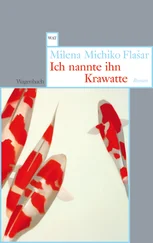Milena Michiko Flašar
I Called Him Necktie
… You are so far removed from this world,
which is beautiful and perhaps meaningful,
so far from any natural fulfillment,
so alone in your emptiness,
so alien and deaf in this great silence…
Max Frisch, An Answer from the Silence
… wie ausgeschieden du bist aus dieser Welt,
die schön ist und vielleicht einen Sinn hat
wie ausgestoßen aus aller natürlichen Vollendung,
wie einsam in deiner Leere,
wie fremd und taub in dieser großen Stille…
Antwort aus der Stille
1
I called him Necktie.
The name pleased him. It made him laugh.
Red gray stripes on his chest. That’s how I want to remember him.
2
Seven weeks have passed since I last saw him. In these seven weeks the grass has grown dry and yellow. Cicadas sit chirping in the trees. Gravel crunches under my feet. In the harsh light of the midday sun, the park looks strangely desolate. Blossoms burst open on branches, bending wearily towards the ground. A faded blue handkerchief lies in the undergrowth, without a breath of wind to stir it. The air is heavy and oppressive. I’m all scrunched up. I say goodbye to someone who will not come again. I’ve known that since yesterday. He is not coming again. Above me stretches the sky that has swallowed him up — forever?
I still cannot believe that our parting is final. In my mind he could return at any moment, perhaps as someone else, perhaps with a different face, could throw me a glance which says: I’m here. Head turned to the north, smiling at the passing clouds. He could. That’s why I am sitting here.
3
I’m sitting on our bench. Before it became ours, it had been mine. I came here to try to work out whether the crack in the wall, that hairline fissure crossing above the bookshelves, had any meaning internal or external. I spent two whole years staring at it. Two whole years in my room, in my parents’ house. Behind my closed eyes I traced its broken line. It had been in my head, had continued there, had penetrated my heart and my arteries. I myself was an anemic stripe. My skin pale as death, for the sun didn’t shine on it. Sometimes I yearned for its touch. I imagined what it would be like to go outside and finally understand: There are rooms one never leaves.
One cold February morning I gave into my yearning. Through the gap in the curtains I could make out a flight of cranes. They flew up and down, with the sun on their wings, and dazzled me. With a stabbing pain in my eyes, I felt my way along the walls of my room towards the door, pushed it open, pulled on a coat and shoes, one size too small, went out onto the street and beyond, past houses and squares. Despite the cold, sweat ran off my forehead and I experienced a strange sense of satisfaction: I can still do it. I can put one foot in front of the other. I have not forgotten how. All efforts to forget were in vain.
I didn’t try to delude myself. Now as before it was about me, it was about being by myself. I didn’t want to meet anyone. Meeting someone means getting involved. An invisible thread is tied. From person to person. Real threads. Back and forth. Meeting someone means becoming part of a web, and I wanted to avoid that.
4
Like on that first walk out. That’s how a prisoner must feel, looking through the bars of the cell he carries around with him, knowing full well he is not free. When I think back to that first walk out, I feel as if I was a figure in black and white walking through a color film. All around the brightness screamed. Yellow taxis, red mailboxes, blue billboards. Their loudness deafened me.
With my collar up I turned the corner and took care not to stumble over anyone’s feet. I feared the thought that my trouser leg could graze the hem of someone’s coat in passing. I clamped my arms to my sides and ran, ran, ran, without looking right or left. The most horrible thing imaginable was the double glances, catching one another at random. The ones that linger for seconds. That never leave you. Such nausea. I was full of them. Full to the brim. The further I ran the more aware I was of the weight of my body. Someone bumped into me. I couldn’t hold it in any longer. With one hand to my mouth I ran into the park and threw up.
5
I knew the park and I knew the bench by the cedar, too. Distant childhood. Mother would beckon me to her, pick me up onto her lap and explain the world to me with a pointed finger. Look, a sparrow! It said chirp, chirp. Her breath was on my cheek. A tickling on the back of my neck. Mother’s hair swayed gently to and fro. When you are small, so small that you believe things will stay the same forever, the world is a friendly place. That’s what I thought when I recognized my childhood bench. This bench, where I should learn that nothing stays as it is, and yet it is still worthwhile being in the world. I am still learning that.
He would say: It was a decision.
And I did really decide to walk over the lawn, towards the bench, and to stand in front of it. I was alone, surrounded by silence. Nobody was there to catch me as I walked once, then once more, around the bench, in ever tighter circles. The taste in my mouth as I eventually sat down. The wish to be a child again. To look with eyes full of amazement. I mean, it was my eyes that became ill at the very beginning. My heart simply followed them. And so I sat in clothing much too thin. I shivered under my skin, which was even thinner.
6
After that I was compelled to come here every morning. I watched the snow as it fell. I watched the snow as it melted again. A gurgling rivulet. With the spring came the people and their voices. I sat with clenched teeth. A retching in my throat. That was the crack in the wall. It separated me from those who were woven in. A couple in love strolled by me whispering. The secret words flowing by me sounded foreign, like the words of a language I had not mastered. I am happy, I heard, inexpressibly happy. A sticky surge on my tongue. I stifled the retching.
Whether anyone was aware of me, I doubt it, and if so, then only as you are aware of a ghost. You see it clearly and distinctly, may not believe that you have seen it, and it’s gone in a blink. I was such a ghost. Even my parents were barely aware of me. If I encountered them in the entrance or the hallway, they murmured incredulously, Oh, it’s you. They had long given up counting me as one of them. We have lost our son. He has died, well before his time. That’s how they must have experienced it. As a deep loss. But gradually they came to terms with it. The sorrow they may have felt to begin with gave way to the realization that it was not in their power to win me back, and however strange the situation may have been for them, even in the strangeness a certain order prevailed. You lived together under the same roof and so long as nothing about it got out, you regarded it as completely normal, to live like that under the same roof.
7
Nowadays I realize that it is impossible not to encounter anyone. In that you are there and breathe, you encounter the whole world. The invisible thread has bound you to the others from the moment of birth. To sever it requires more than a death, and there’s no use opposing it.
When he appeared I have no idea.
I say: He appeared. For that was how it was. One morning in May he suddenly appeared. I sat on my bench, my collar turned up. A pigeon took flight. I felt dizzy from the beating of its wings. When I closed my eyes and opened them again, he was there.
A salaryman. Mid fifties. He wore a gray suit, a white shirt, a red and gray striped tie. In his right hand swung a briefcase. Brown leather. He walked, swinging it to and fro, shoulders bent forward, face turned away. Somehow tired. Without looking at me he sat down on the opposite bench. Crossed one leg over the other. Stayed like that. Motionless. His face tense as he looked away. He was waiting for something. Something was going to happen. Soon, soon. Bit by bit his muscles relaxed and he leaned back with a sigh. Such a sigh, like there was something inside him waiting to occur.
Читать дальше












